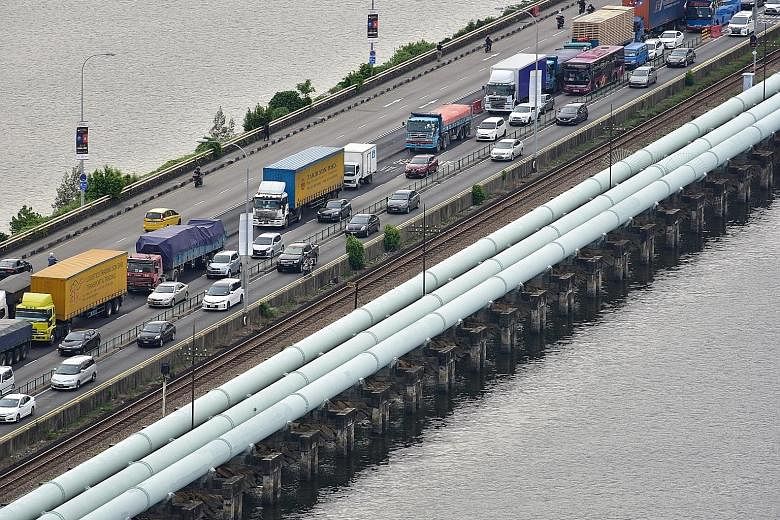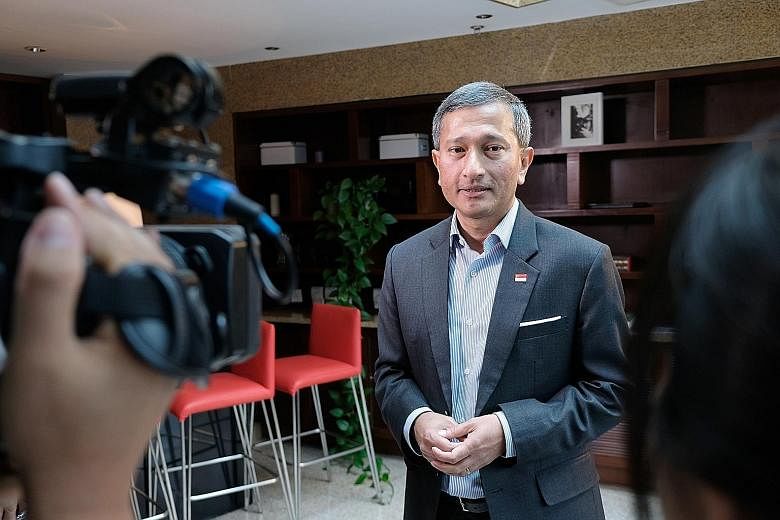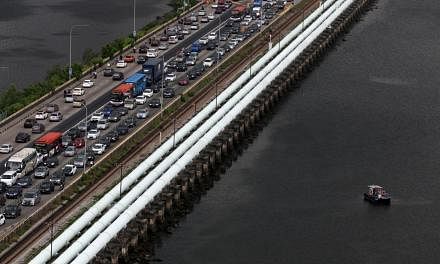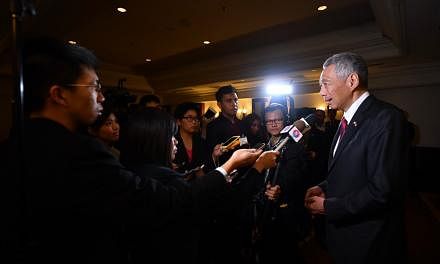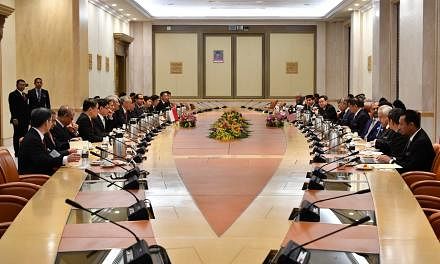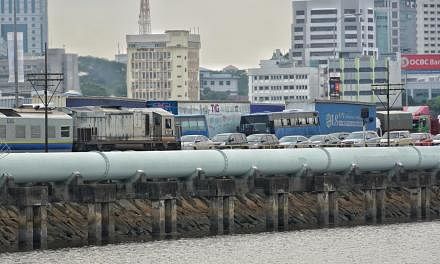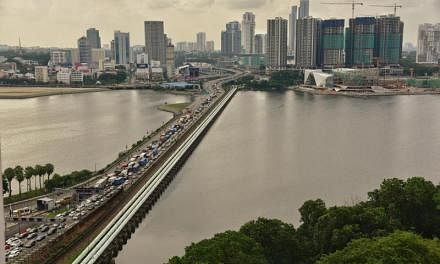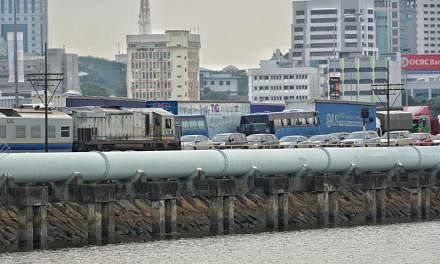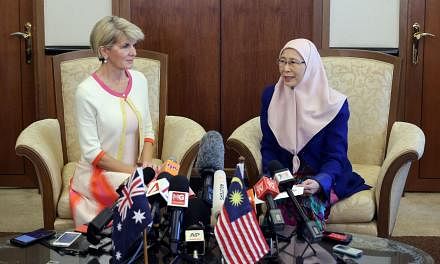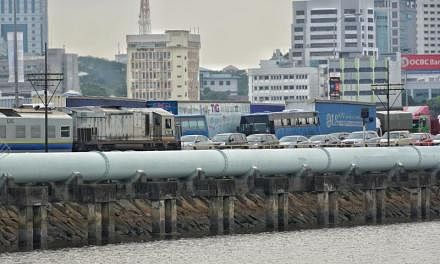In 1987, Malaysia had the right to review the price of water under the 1962 Water Agreement. But it chose not to, Foreign Minister Vivian Balakrishnan said yesterday.
In fact, its leaders subsequently also acknowledged they chose not to ask for the review because the pricing arrangement under the 1962 agreement benefited them, he told the House.
Water, however, is in the spotlight again as a potential bilateral issue after Malaysian Prime Minister Mahathir Mohamad said about a fortnight ago that the price at which raw water is sold to Singapore is "ridiculous".
Dr Balakrishnan yesterday reiterated that the 1962 Water Agreement (62WA) is no ordinary agreement, as it was guaranteed by both countries in the 1965 Separation Agreement, which was registered with the United Nations.
"Any breach of the 62WA would call into question the Separation Agreement, which is the basis for Singapore's very existence as an independent sovereign state," he said.
The agreement allows Singapore to draw up to 250 million gallons of raw water daily from Johor state at three sen (1 Singapore cent) per 1,000 gallons.
Johor then buys treated water from Singapore at 50 sen per 1,000 gallons, as provided for under the deal. This is a fraction of the cost to Singapore of treating the water, Dr Balakrishnan noted.
-
THE PRICE OF WATER
-
Singapore can draw up to 250 million gallons of raw water from Johor daily at three sen (1 Singapore cent) per 1,000 gallons under the 1962 Water Agreement.
It costs Singapore RM2.40 to treat every 1,000 gallons of water. By selling it to Malaysia at 50 sen, Singapore is giving a subsidy of RM1.90 per 1,000 gallons.
Dr Balakrishnan noted that in 2002, then Johor State Assembly Speaker Zainalabidin Mohd Zain said a review in 1986 of the water price was pointless because Johor relied on Singapore for treated water, and Singapore would have priced it higher for Johor.
Johor is entitled to buy up to 5 million gallons of treated water a day under the 1962 Water Agreement, but it has regularly bought more than this - up to 16 million gallons of treated water a day.
The Linggiu dam, together with other saddle embankments and ancillary works to create the Linggiu Reservoir, was completed at a cost of $310 million to Singapore.
Singapore also paid RM320 million (S$208 million at 1990 rates) to Johor in 1990 as compensation for the land used for the Linggiu Reservoir project and for the potential loss of revenue from logging activities, and as a one-time payment for the lease of that land for the remaining tenure of the 1962 agreement.
"Hence, in 2002, then PM Dr Mahathir said Malaysia did not ask for a review when it was due as Malaysia knew that any revision would also affect the price of treated water sold by Singapore to Malaysia," he added.
It costs Singapore RM2.40 to treat every 1,000 gallons of water. By selling it to Malaysia at 50 sen, Singapore is giving a subsidy of RM1.90 per 1,000 gallons.
In a booklet on water issues released in 2003, the Singapore government said that while Johor is entitled to buy 17 million gallons of water daily under the 1961 and 1962 water agreements, it bought 37 million gallons. Johor then sells it to its people at RM3.95 per 1,000 gallons, earning a profit of RM3.45 per 1,000 gallons, or RM46 million a year, said the 2003 booklet.
Dr Balakrishnan noted that in 2002, then Johor State Assembly Speaker Zainalabidin Mohd Zain said a review in 1986 of the water price was pointless because Johor relied on Singapore for treated water, and Singapore would have priced it higher for Johor.
The 1961 water agreement lapsed in 2011.
The minister also said Johor buys more treated water from Singapore than it is entitled to under the 1962 deal. The extra supply, requested by Johor, is sold at the rate given in the 1962 agreement, on a goodwill basis.
Dr Balakrishnan added that if Malaysia had exercised the right to review the water price in 1986/ 1987, Singapore might have made different investment decisions on developing the Johor River and its water catchment areas.
Citing the Linggiu Dam, he noted that in 1990, Singapore's national water agency PUB and Johor signed an agreement to build the dam to increase the yield of the Johor River so that PUB can reliably get its full entitlement of 250 million gallons of water daily.
Johor owns the Linggiu Dam, but Singapore paid for its construction and operation costs.
The dam - with other saddle embankments and ancillary works to create the Linggiu Reservoir - was completed in April 1993 at a cost of $310 million.
The construction and operation costs are on top of the RM320 million (S$208 million at 1990 rates) paid to Johor in 1990 as compensation for the land used for the Linggiu Reservoir project and for the potential loss of revenue from logging activities. It is a one-time payment as well for the lease of that land for the remaining tenure of the 1962 agreement, Dr Balakrishnan said.
Singapore's approach to the water issue is supported by three fundamental principles of its foreign policy, he added.
These are sticking up for international law and respecting the sanctity of international agreements, resolving disputes according to international law and upholding Singapore's reputation as a credible, trusted and consistent partner, and a country that abides fully by its international obligations.
"This reputation creates poli-tical and economic space for Singapore and Singaporeans," Dr Balakrishnan said. "This is especially crucial as we are an international financial centre."
Note: This article has been edited for clarity.
